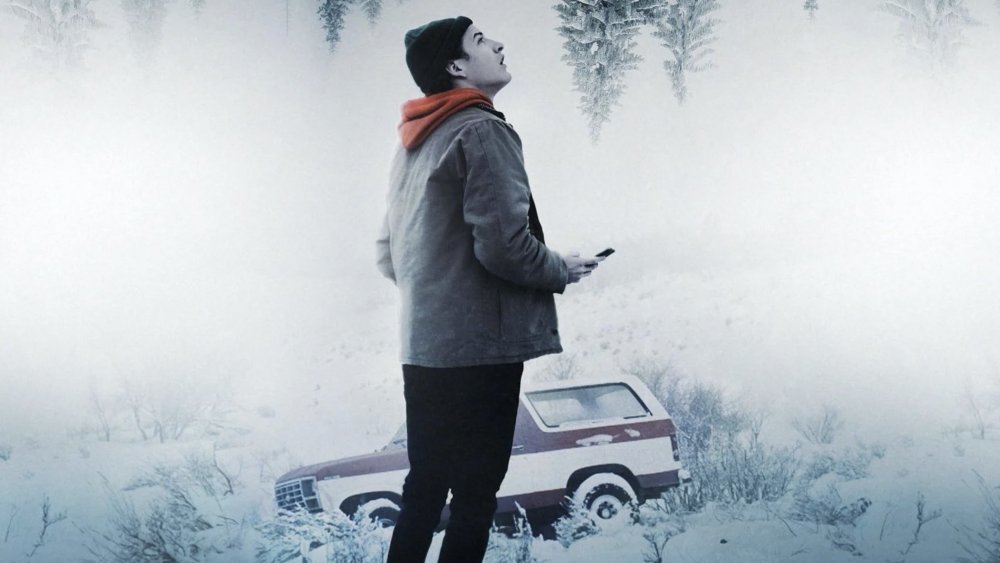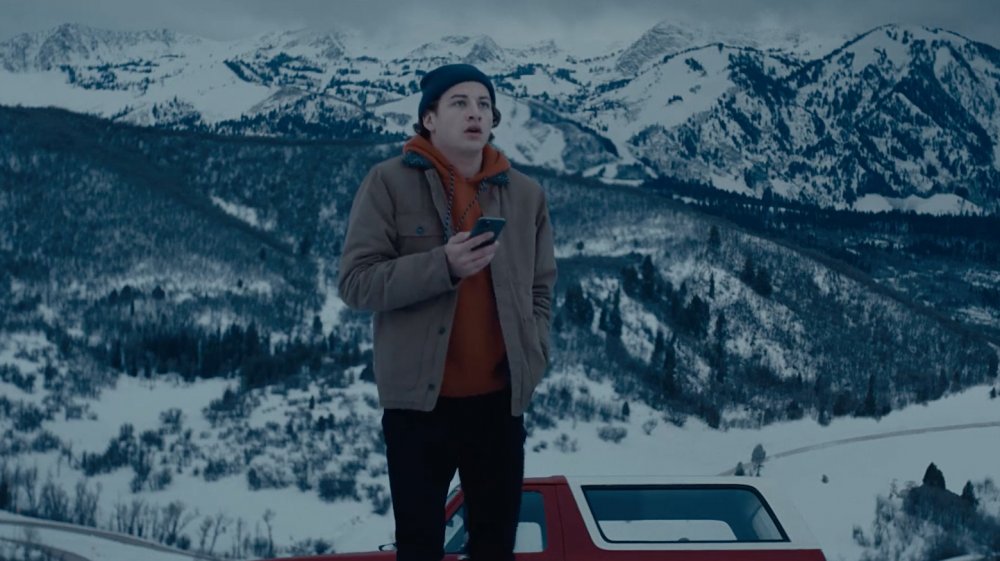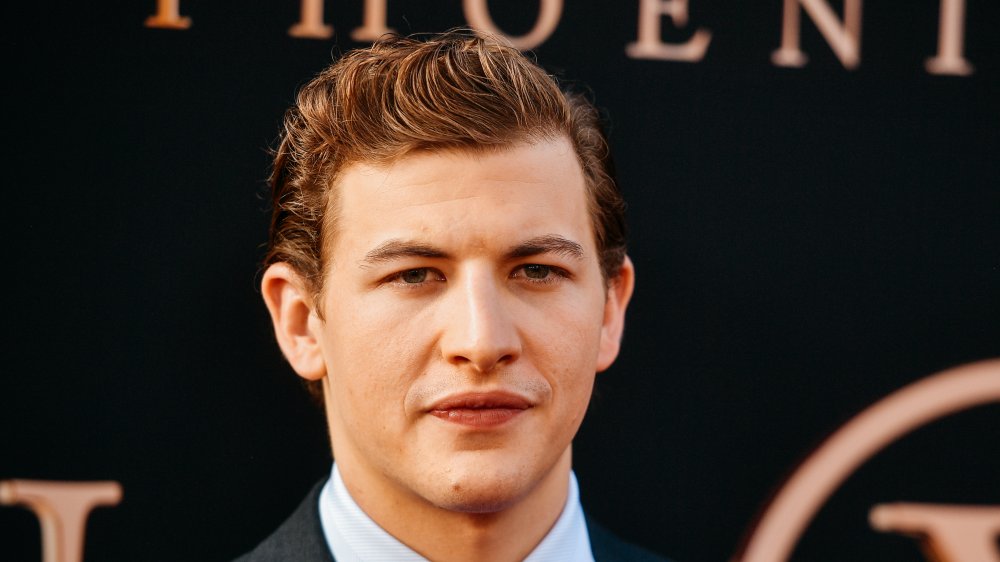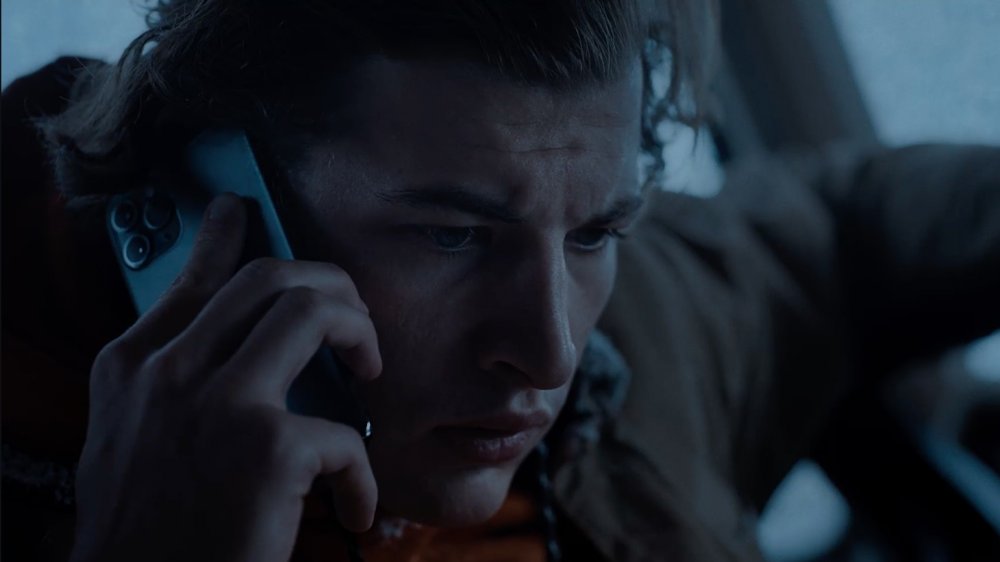Wireless's Tye Sheridan Explains How Quibi's New Show Is All About Perspective - Exclusive Interview
Quibi's new survival thriller Wireless is an exhilarating viewing adventure. The streaming channel creates programs to watch on a mobile phone. With this show, which features Steven Soderbergh as its executive producer and Zach Wechter as co-writer and director, things are elevated to a new level — interactive technology places viewing control in users' hands. Watch the show from a horizontal view for a classic cinematic perspective or twist the phone into a vertical position to see what the main character sees, including video chats, texts, and phone call interactions.
This show finds its protagonist, Andy Braddock (Tye Sheridan), stranded during a winter storm. On his way to a New Year's Eve party, the chaotic winter weather that should have deterred him from driving was only one part of the equation that led Andy to be stuck in a remote location. Texting while driving and attempting to take a detour were the other factors.
The only resource Andy has is his iPhone and how he uses it helps us learn about his emotional and mental state. It also gives viewers a deeper look at his life, offering explanations for those feelings and decisions, and even inspires a look at our individual relationships with these prevalent devices.
Tye Sheridan talked to Looper in an exclusive interview about this innovative program, explaining why the role was so inviting and how it takes an important look at how we traverse the digital landscape.
What drew Tye Sheridan to Wireless
Did the interactive part of the technology attract you to the role of Andy?
A thousand percent. I think that it was the most intriguing element for me. Not that any other of the other elements weren't intriguing, all of it was intriguing. I think I was super interested in the liquidity platform and this new way of launching content and releasing content on a mobile-only platform. And I think I was super intrigued by this new format of giving the audience the opportunity to watch a narrative however they want. Whether they want to watch it in a more traditional landscape perspective that we watch most of our cinema in or turn it vertically to have a more personal experience with our main characters' iPhone, and how he interfaces the digital world that we're all so familiar with.
Have you watched it on your phone and utilized the technology?
I haven't watched the entire series on Quibi yet, but I have seen the entire series on another application. I've definitely seen the show prior to the release, and I have seen a few episodes on Quibi. It's super cool to see it come out and to see it on a platform live. I think that was a big question, right? Like, is this going to work? And I always believed that it would. And I think especially Zach Wechter and Jack Seidman, the writers, did such an impressive job making this world so authentic. I always believed in the format and the setting of the show and whether it would work.
Not only is it visually appealing, but it also ends up being quite comfortable flipping the phone around; very intuitive.
That's great to hear. I think it's super intuitive. Of course, it depends on how much time you've spent using an iPhone and how familiar you are with that technology. I think some generations may be more familiar than others, but it's amazing how intuitive it is. You hear Andy typing on his phone, and you know he's texting someone. The sounds are so important because they are what motivate you to rotate the phone vertically and to see who's texting. It's amazing how you just stop thinking about it after a while and it becomes very intuitive. At least for me, it did.
Why filming in isolation was great
Was it hard shooting a show where you are the only actor physically present in the scenes?
No. I think the bigger challenge was the project in its nature. It was challenging technologically, super challenging because we had 19 days to shoot the project. A lot of times we weren't able to shoot the vertical perspective and the horizontal perspectives with a landscape perspective at the same time. So, it was a lot like shooting two films at once in 19 days. Anyone's who's ever made a film knows that is super challenging. Hats off to [director] Zach Wechter and the rest of the crew for accomplishing what we did. I'm super proud of what we went out there and made.
Did communicating with your castmates through the phone made you feel less isolated?
The cool thing about the fact that I'm alone for a large portion of the narrative of the story is that when Andy does communicate with somebody, be it text or Instagram, Tinder, a FaceTime call, or just a regular phone call, we were able to do those real-time. So it didn't feel like I was doing [the show] alone.
Doing that in real time definitely lent itself to the show's authenticity.
Zach Wechter was super adamant about that because that is why the show feels so authentic — because all of this was happening in real time. For example, all the phone calls with Andy's mom, who's played by Andie MacDowell, were happening in real time. She was on the other end of the line and we were recording audio in two separate places and we were shooting my side. Zach was adamant about doing that, and I'm so glad that he was because it's really hard to act off of something that's prerecorded. We did the FaceTime calls the same way, so when you watch the show, you'll see Andy's best friend, Jake, he's at the New Year's Eve party that Andy's ultimately trying to get to and he's running around this big house with all these people — they're all on FaceTime together. I was in a Bronco a mile or so down the road. Shooting those calls in real time was great. There were, of course, challenging aspects like dealing with spotty Wi-Fi or mobile network issues, but outside of that, it was cool to be able to do that.
Sheridan explains how he related to his character and how he thinks everyone can
Did you identify with Andy?
Yeah. I think that everyone can identify with Andy. Everyone has, or most people have, smartphones in our pockets. Most of us have Instagram. Some of us have Tinder. Most of us iMessage each other. Most of us FaceTime. I think he's a super relatable character because we're via this digital interface that he's communicating through. Your iPhone is largely an extension of yourself — it has all your contacts, your photos. You're able to understand who someone is just by looking at their Instagram. I think that idea becomes super intriguing when the iPhone becomes the setting for a narrative.
Despite the extreme weather circumstances he is facing, we do get to know a lot about Andy's life.
You can watch in a vertical perspective the whole time and look at Andy's life — his text conversations, his Instagram — and you can understand what kind of person he is. I think he's relatable because of that, but this is also a very personal story. Not only because you are seeing all of his social media accounts and texts and FaceTime calls, but it's personal to the viewer because you're watching it on your own phone.
Did it make you think a lot about your own relationship with your phone?
Yes. I think it should make everyone think about their relationship with their phone. And I think the ultimate question that this show provokes is whether their relationship with their phone is good or is it bad? I think that this show shows both sides of that. It shows that Andy probably wouldn't crash his car if he wasn't texting while driving, but he also wouldn't have any sort of survival tool if it weren't for his iPhone.



